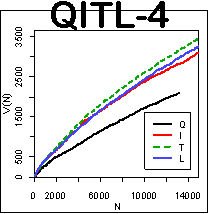Invited Speakers
There are three plenary talks on the conference and one on the pre-conference workshop:
Workshop Plenary
-
Prof. R. Harald Baayen - University of Alberta -
Resource requirements for neo-generative modeling in (psycho)linguistics [ abstract ]
Main Conference Plenaries
- Prof. Heike Behrens - University of Basel -
What Counts? the Graded Nature of Rule Abstraction in Child Language
Quantitative corpus linguistics plays a decisive role in usage-based, constructivist approaches to language acquisition. First, evidence is needed that the input available to the child provides the necessary information for abstracting the target language system(s). Second, the distributional properties of the language input and its uptake by the learner help to identify the learning mechanisms, especially with regard to refining the relative contribution of functional factors and perceptual factors like salience and frequency. Recent research has shown that the input available to the child highlights a subset of the linguistic system in which the basic morphological and syntactic properties are available in a rather consistent fashion. The findings give rise to a third perspective in quantitative acquisition research: what does the child generalize over? If we assume that children do not have access to adult-like categories, and do not command the full range of options of a particular structure, we have to define how to conceive of the intermediate levels of acquisition. In this presentation I will use extensive corpus data on German child language to show how German noun inflection (plural classes, declension classes) is acquired through a gradual generalization over the phonotactic properties of the noun root. This results in acquisition sequences that are largely error-free although or because the underlying generalizations are rather local.
- Dr. Hermann Moisl - University of Newcastle upon Tyne -
Corpus-Based Generation of Linguistic Hypotheses using Quantitative Methods
In linguistics as in other sciences, the de facto standard methodology is based on Karl Popper's concept of the falsifiable hypothesis, whereby a hypothesis is proposed in answer to a research question about some domain of interest and then tested by observation of the domain. Because of their centrality, it is natural to ask how hypotheses are generated.
The consensus in philosophy of science is that hypothesis generation is non-algorithmic, that is, not reducible to a formula, but is rather driven by human intellectual creativity in response to a research question using a combination of deductive inference from existing axioms and theorems, and inductive inference of generalizations from observation of the domain. Hypothesis generation by deductive inference has long been dominant in generative linguistics and, to a lesser extent, in other subdisciplines like historical linguistics and sociolinguistics. The advent in recent decades of large amounts of digital electronic text amenable to computational analysis has, however, made hypothesis generation by inductive inference viable. This paper shows how mathematical and statistical techniques such as cluster analysis and singular value composition can be used for that purpose.
- Prof. Ingo Plag - University of Siegen -
Compound Stress Assignment Emerges from the Lexicon
In both psycholinguistic and theoretical-linguistic circles there is a debate about the nature and role of symbolic rules, associative networks, and analogical or exemplar-based models in the organization of language in general, and of morphology and the lexicon in particular. Compounding has featured prominently in this debate and the present paper complements this line of research by focussing on an aspect of semi-regularity in compounds that had received little attention until a few years back: stress assignment in English noun-noun compounds.
English noun-noun compounds are traditionally assumed to be subject to the Compound Stress Rule, which states that the left-hand constituent is more prominent than the right-hand constituent. However, not all English noun-noun compounds abide to the Compound Stress Rule (cf. for example, ópera glasses, wátch-maker and Óxford Street versus steel brídge, morning páper, and Madison Ávenue). Rightward stress is far from exceptional, and the nature of the observable variability is still under debate.
In this paper I will argue that compound stress assignment emerges from the lexicon. We carried out a number of experimental and corpus-based quantitative and computational studies of a large number of English compounds that show that deterministic, rule-based approaches are not very successful in predicting compound stress. In contrast, it is possible to use the individual properties of stored compounds and different types of lexical relatedness between these compounds to successfully model compound stress assignment. This modeling can be done with the help of different kinds of multiple regression or by using analogical computational algorithms. Depending on the respective data set, these models vary in their predictive accuracy, but generally outperform deterministic models.
Our results are in line with the bulk of more recent psycholinguistic research on lexical processing and are impossible to account for under a rule-based theory of compound stress.
